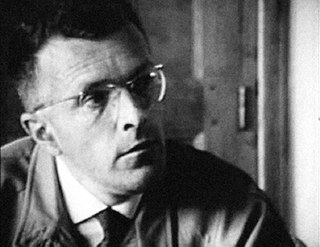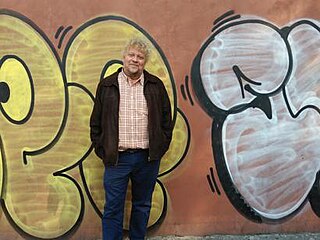The following outline is provided as an overview of and topical guide to critical theory:

Jürgen Habermas is a German philosopher and social theorist in the tradition of critical theory and pragmatism. His work addresses communicative rationality and the public sphere.

Theodor W. Adorno was a German philosopher, musicologist, and social theorist.

The Frankfurt School is a school of thought in sociology and critical philosophy. It is associated with the Institute for Social Research founded at Goethe University Frankfurt in 1923. Formed during the Weimar Republic during the European interwar period, the first generation of the Frankfurt School was composed of intellectuals, academics, and political dissidents dissatisfied with the contemporary socio-economic systems of the 1930s; namely, capitalism, fascism, and communism.
The term culture industry was coined by the critical theorists Theodor Adorno (1903–1969) and Max Horkheimer (1895–1973), and was presented as critical vocabulary in the chapter "The Culture Industry: Enlightenment as Mass Deception", of the book Dialectic of Enlightenment (1947), wherein they proposed that popular culture is akin to a factory producing standardized cultural goods—films, radio programmes, magazines, etc.—that are used to manipulate mass society into passivity. Consumption of the easy pleasures of popular culture, made available by the mass communications media, renders people docile and content, no matter how difficult their economic circumstances. The inherent danger of the culture industry is the cultivation of false psychological needs that can only be met and satisfied by the products of capitalism; thus Adorno and Horkheimer perceived mass-produced culture as especially dangerous compared to the more technically and intellectually difficult high arts. In contrast, true psychological needs are freedom, creativity, and genuine happiness, which refer to an earlier demarcation of human needs, established by Herbert Marcuse.
Social philosophy examines questions about the foundations of social institutions, behavior, power structures, and interpretations of society in terms of ethical values rather than empirical relations. Social philosophers emphasize understanding the social contexts for political, legal, moral and cultural questions, and the development of novel theoretical frameworks, from social ontology to care ethics to cosmopolitan theories of democracy, natural law, human rights, gender equity and global justice.

Gilbert Simondon was a French philosopher best known for his theory of individuation and his work on the field of philosophy of technology. Simondon's work is characterized by his philosophical approach on information theory, communication studies, technology and the natural sciences. Although largely overlooked in his lifetime, the advent of the information age has collaborated to a reappraisal and increased interest in Simondon's books, with him being seen as someone who has precisely predicted and described the social effects and paradigms technical objects and technology itself have offered in the 21st century.

Eros and Civilization: A Philosophical Inquiry into Freud is a book by the German philosopher and social critic Herbert Marcuse, in which the author proposes a non-repressive society, attempts a synthesis of the theories of Karl Marx and Sigmund Freud, and explores the potential of collective memory to be a source of disobedience and revolt and point the way to an alternative future. Its title alludes to Freud's Civilization and Its Discontents (1930). The 1966 edition has an added "political preface".
In sociology, communicative action is cooperative action undertaken by individuals based upon mutual deliberation and argumentation. The term was developed by German philosopher-sociologist Jürgen Habermas in his work The Theory of Communicative Action.
The positivism dispute was a political-philosophical dispute between the critical rationalists and the Frankfurt School in 1961, about the methodology of the social sciences. It grew into a broad discussion within German sociology from 1961 to 1969. The naming itself is controversial, since it was the Frankfurt School proponents who accused the critical rationalists of being positivists—while the latter considered themselves to be opponents of positivism.

The Theory of Communicative Action is a two-volume 1981 book by the philosopher Jürgen Habermas, in which the author continues his project of finding a way to ground "the social sciences in a theory of language", which had been set out in On the Logic of the Social Sciences (1967). The two volumes are Reason and the Rationalization of Society, in which Habermas establishes a concept of communicative rationality, and Lifeworld and System: A Critique of Functionalist Reason, in which Habermas creates the two level concept of society and lays out the critical theory for modernity.

Andrew Feenberg is an American philosopher. He holds the Canada Research Chair in the Philosophy of Technology in the School of Communication at Simon Fraser University in Vancouver. His main interests are philosophy of technology, continental philosophy, critique of technology and science and technology studies.
Thomas McCarthy is John Shaffer Professor of Philosophy Emeritus at Northwestern University. Before joining Northwestern in 1985, he taught for four years at Munich University and for thirteen years at Boston University. After retiring from Northwestern in 2006, he served for three years as William H. Orrick Visiting Professor at Yale University. Over the course of his academic career, McCarthy's work was supported by grants and fellowships from the National Endowment for the Humanities, the Alexander von Humboldt Foundation, the American Council of Learned Societies, and the Guggenheim Foundation. Early in his career he wrote and taught principally in the philosophy of logic and mathematics and then in the philosophy of the social sciences. Subsequently, and for the bulk of his career, he worked in the general area of critical, social and political theory, and in particular on the work of Jürgen Habermas, of which he is widely regarded as one of the foremost English-language interpreters. During his last decade of teaching, McCarthy focused on theoretical issues in the history of racist and imperialist thought, and particularly on their interweaving in theories of progress and development.
The following outline is provided as an overview of and topical guide to communication:
Repressive desublimation is a term, first coined by Frankfurt School philosopher and sociologist Herbert Marcuse in his 1964 work One-Dimensional Man, that refers to the way in which, in advanced industrial society (capitalism), "the progress of technological rationality is liquidating the oppositional and transcending elements in the “higher culture.” In other words, where art was previously a way to represent "that which is" from "that which is not," capitalist society causes the "flattening out" of art into a commodity incorporated into society itself. As Marcuse put it in One-Dimensional Man, "The music of the soul is also the music of salesmanship."

A critical theory is any approach to humanities and social philosophy that focuses on society and culture to attempt to reveal, critique, and challenge power structures. With roots in sociology and literary criticism, it argues that social problems stem more from social structures and cultural assumptions rather than from individuals. Some hold it to be an ideology, others argue that ideology is the principal obstacle to human liberation. Critical theory finds applications in various fields of study, including psychoanalysis, film theory, literary theory, cultural studies, history, communication theory, philosophy, and feminist theory.

Hegel's Ontology and the Theory of Historicity is a 1932 book about the philosopher Georg Wilhelm Friedrich Hegel and his theory of historicity by the philosopher Herbert Marcuse. It is influenced by the philosopher Martin Heidegger.

Stefan Gandler is a philosopher and social scientist. He studied at Frankfurt University and has lived in Mexico since 1993

Rahel Jaeggi is a Swiss professor of practical philosophy and social philosophy at the Humboldt University of Berlin. Her research areas are in social philosophy, political philosophy, ethics, philosophical anthropology, social ontology, and critical theory. Since February 2018 she has been the head of the Berlin campus of the newly founded International Center for Humanities and Social Change.









